Management and Operations Report: Leaders, Managers, and Roles
VerifiedAdded on 2023/06/04
|14
|4329
|107
Report
AI Summary
This report delves into the distinct roles of leaders and managers within a business context, highlighting their characteristics and comparing their functions. It explores various leadership theories, including transformational, situational, systems, and contingency approaches, analyzing their strengths and weaknesses in different work environments. The report examines how these theories are applied in practical business situations, such as conflict resolution and employee motivation within multinational corporations like Unilever. Furthermore, it outlines key approaches to operations management, the role of leaders and managers in achieving business objectives, and the factors impacting operational decision-making. The analysis covers operational planning, product design, and quality control, assessing how leaders and managers can improve efficiencies and address challenges within the business environment to meet strategic goals.
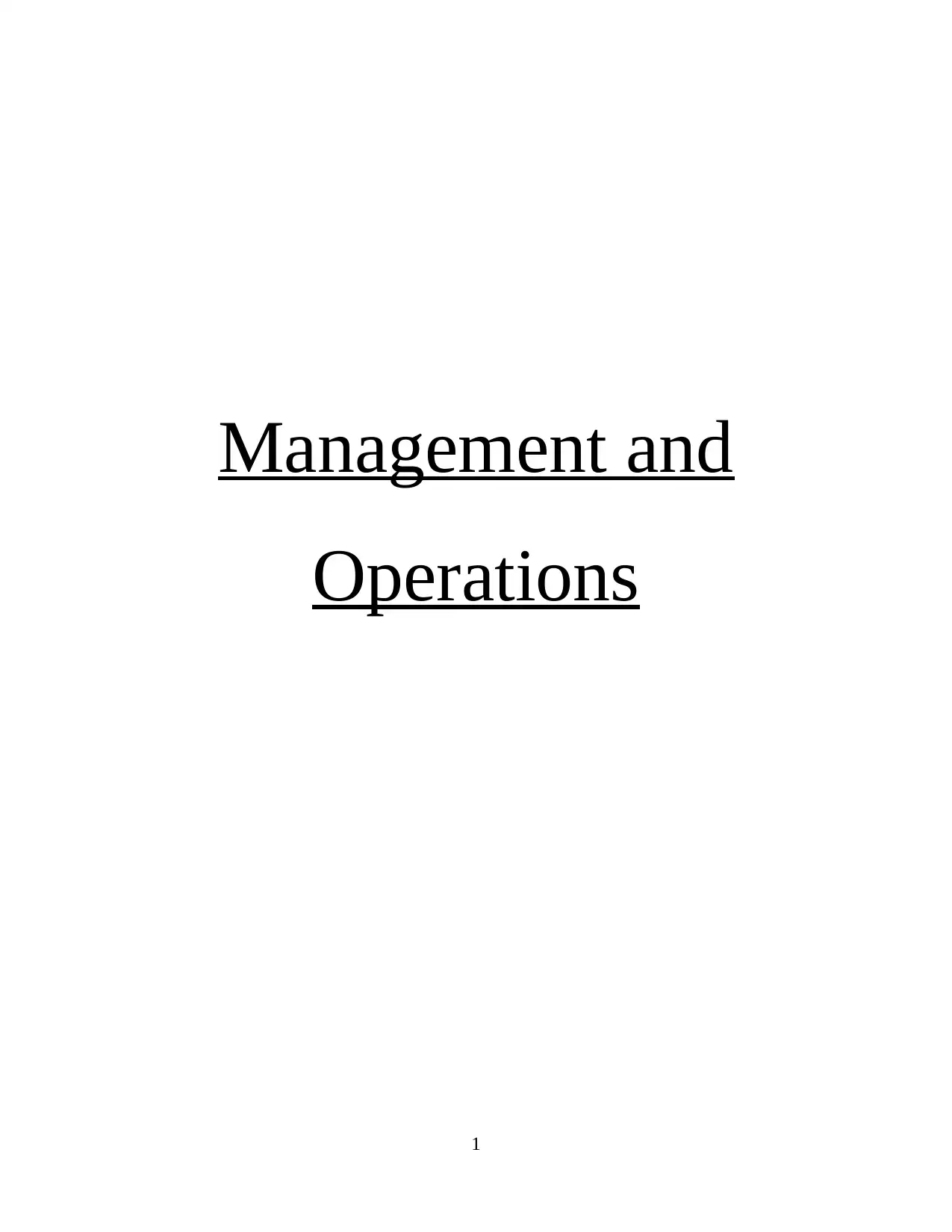
Management and
Operations
1
Operations
1
Paraphrase This Document
Need a fresh take? Get an instant paraphrase of this document with our AI Paraphraser
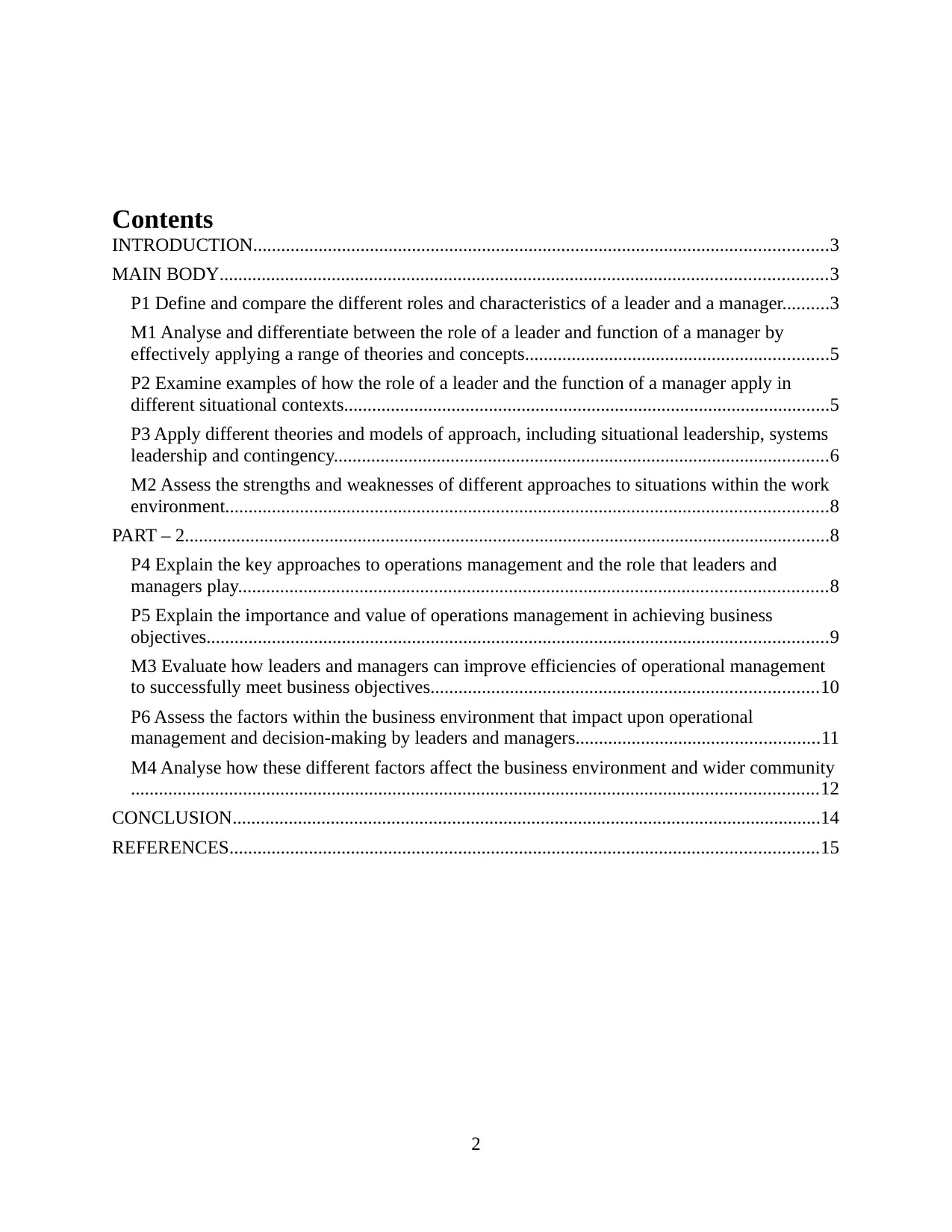
Contents
INTRODUCTION...........................................................................................................................3
MAIN BODY..................................................................................................................................3
P1 Define and compare the different roles and characteristics of a leader and a manager..........3
M1 Analyse and differentiate between the role of a leader and function of a manager by
effectively applying a range of theories and concepts.................................................................5
P2 Examine examples of how the role of a leader and the function of a manager apply in
different situational contexts........................................................................................................5
P3 Apply different theories and models of approach, including situational leadership, systems
leadership and contingency..........................................................................................................6
M2 Assess the strengths and weaknesses of different approaches to situations within the work
environment.................................................................................................................................8
PART – 2..........................................................................................................................................8
P4 Explain the key approaches to operations management and the role that leaders and
managers play..............................................................................................................................8
P5 Explain the importance and value of operations management in achieving business
objectives.....................................................................................................................................9
M3 Evaluate how leaders and managers can improve efficiencies of operational management
to successfully meet business objectives...................................................................................10
P6 Assess the factors within the business environment that impact upon operational
management and decision-making by leaders and managers....................................................11
M4 Analyse how these different factors affect the business environment and wider community
...................................................................................................................................................12
CONCLUSION..............................................................................................................................14
REFERENCES..............................................................................................................................15
2
INTRODUCTION...........................................................................................................................3
MAIN BODY..................................................................................................................................3
P1 Define and compare the different roles and characteristics of a leader and a manager..........3
M1 Analyse and differentiate between the role of a leader and function of a manager by
effectively applying a range of theories and concepts.................................................................5
P2 Examine examples of how the role of a leader and the function of a manager apply in
different situational contexts........................................................................................................5
P3 Apply different theories and models of approach, including situational leadership, systems
leadership and contingency..........................................................................................................6
M2 Assess the strengths and weaknesses of different approaches to situations within the work
environment.................................................................................................................................8
PART – 2..........................................................................................................................................8
P4 Explain the key approaches to operations management and the role that leaders and
managers play..............................................................................................................................8
P5 Explain the importance and value of operations management in achieving business
objectives.....................................................................................................................................9
M3 Evaluate how leaders and managers can improve efficiencies of operational management
to successfully meet business objectives...................................................................................10
P6 Assess the factors within the business environment that impact upon operational
management and decision-making by leaders and managers....................................................11
M4 Analyse how these different factors affect the business environment and wider community
...................................................................................................................................................12
CONCLUSION..............................................................................................................................14
REFERENCES..............................................................................................................................15
2
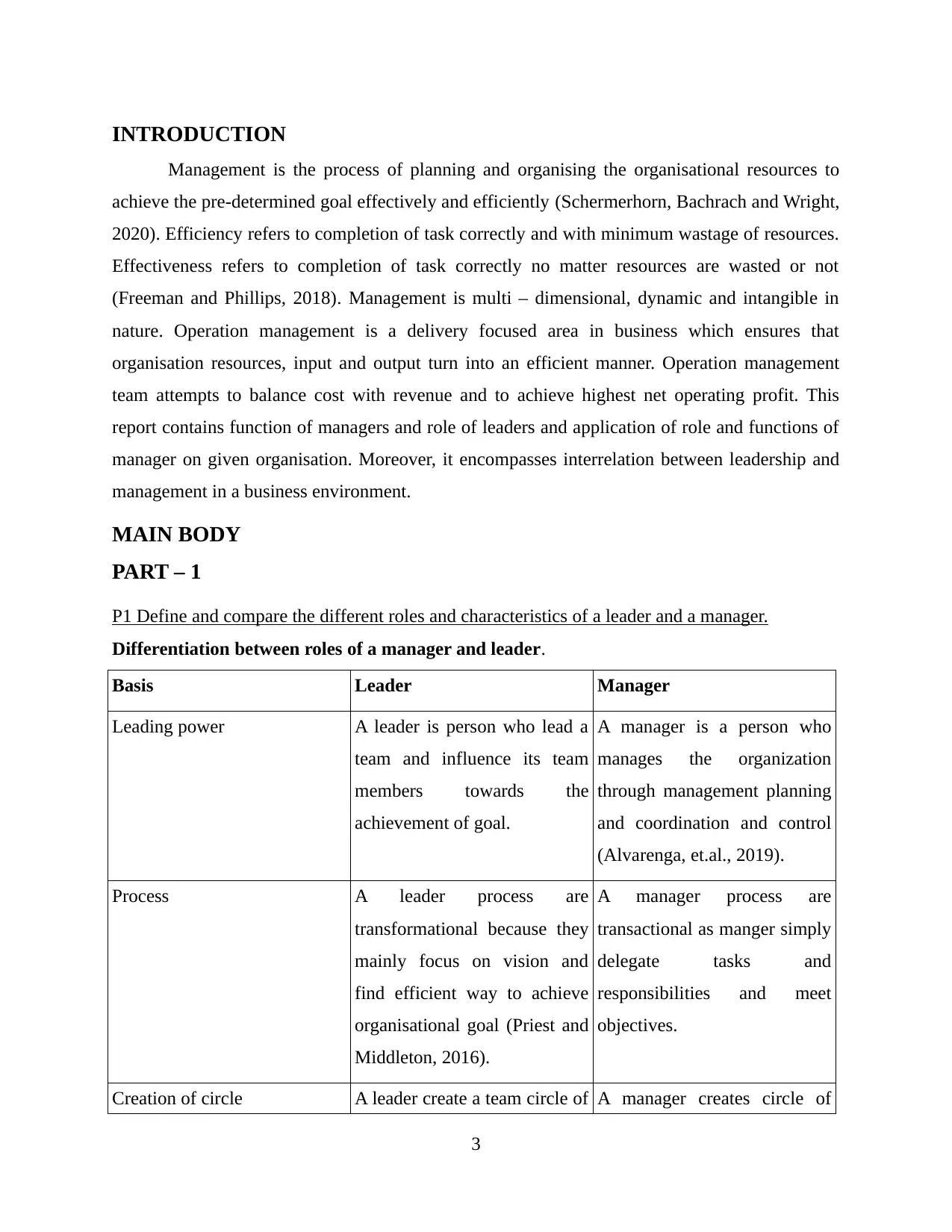
INTRODUCTION
Management is the process of planning and organising the organisational resources to
achieve the pre-determined goal effectively and efficiently (Schermerhorn, Bachrach and Wright,
2020). Efficiency refers to completion of task correctly and with minimum wastage of resources.
Effectiveness refers to completion of task correctly no matter resources are wasted or not
(Freeman and Phillips, 2018). Management is multi – dimensional, dynamic and intangible in
nature. Operation management is a delivery focused area in business which ensures that
organisation resources, input and output turn into an efficient manner. Operation management
team attempts to balance cost with revenue and to achieve highest net operating profit. This
report contains function of managers and role of leaders and application of role and functions of
manager on given organisation. Moreover, it encompasses interrelation between leadership and
management in a business environment.
MAIN BODY
PART – 1
P1 Define and compare the different roles and characteristics of a leader and a manager.
Differentiation between roles of a manager and leader.
Basis Leader Manager
Leading power A leader is person who lead a
team and influence its team
members towards the
achievement of goal.
A manager is a person who
manages the organization
through management planning
and coordination and control
(Alvarenga, et.al., 2019).
Process A leader process are
transformational because they
mainly focus on vision and
find efficient way to achieve
organisational goal (Priest and
Middleton, 2016).
A manager process are
transactional as manger simply
delegate tasks and
responsibilities and meet
objectives.
Creation of circle A leader create a team circle of A manager creates circle of
3
Management is the process of planning and organising the organisational resources to
achieve the pre-determined goal effectively and efficiently (Schermerhorn, Bachrach and Wright,
2020). Efficiency refers to completion of task correctly and with minimum wastage of resources.
Effectiveness refers to completion of task correctly no matter resources are wasted or not
(Freeman and Phillips, 2018). Management is multi – dimensional, dynamic and intangible in
nature. Operation management is a delivery focused area in business which ensures that
organisation resources, input and output turn into an efficient manner. Operation management
team attempts to balance cost with revenue and to achieve highest net operating profit. This
report contains function of managers and role of leaders and application of role and functions of
manager on given organisation. Moreover, it encompasses interrelation between leadership and
management in a business environment.
MAIN BODY
PART – 1
P1 Define and compare the different roles and characteristics of a leader and a manager.
Differentiation between roles of a manager and leader.
Basis Leader Manager
Leading power A leader is person who lead a
team and influence its team
members towards the
achievement of goal.
A manager is a person who
manages the organization
through management planning
and coordination and control
(Alvarenga, et.al., 2019).
Process A leader process are
transformational because they
mainly focus on vision and
find efficient way to achieve
organisational goal (Priest and
Middleton, 2016).
A manager process are
transactional as manger simply
delegate tasks and
responsibilities and meet
objectives.
Creation of circle A leader create a team circle of A manager creates circle of
3
⊘ This is a preview!⊘
Do you want full access?
Subscribe today to unlock all pages.

Trusted by 1+ million students worldwide
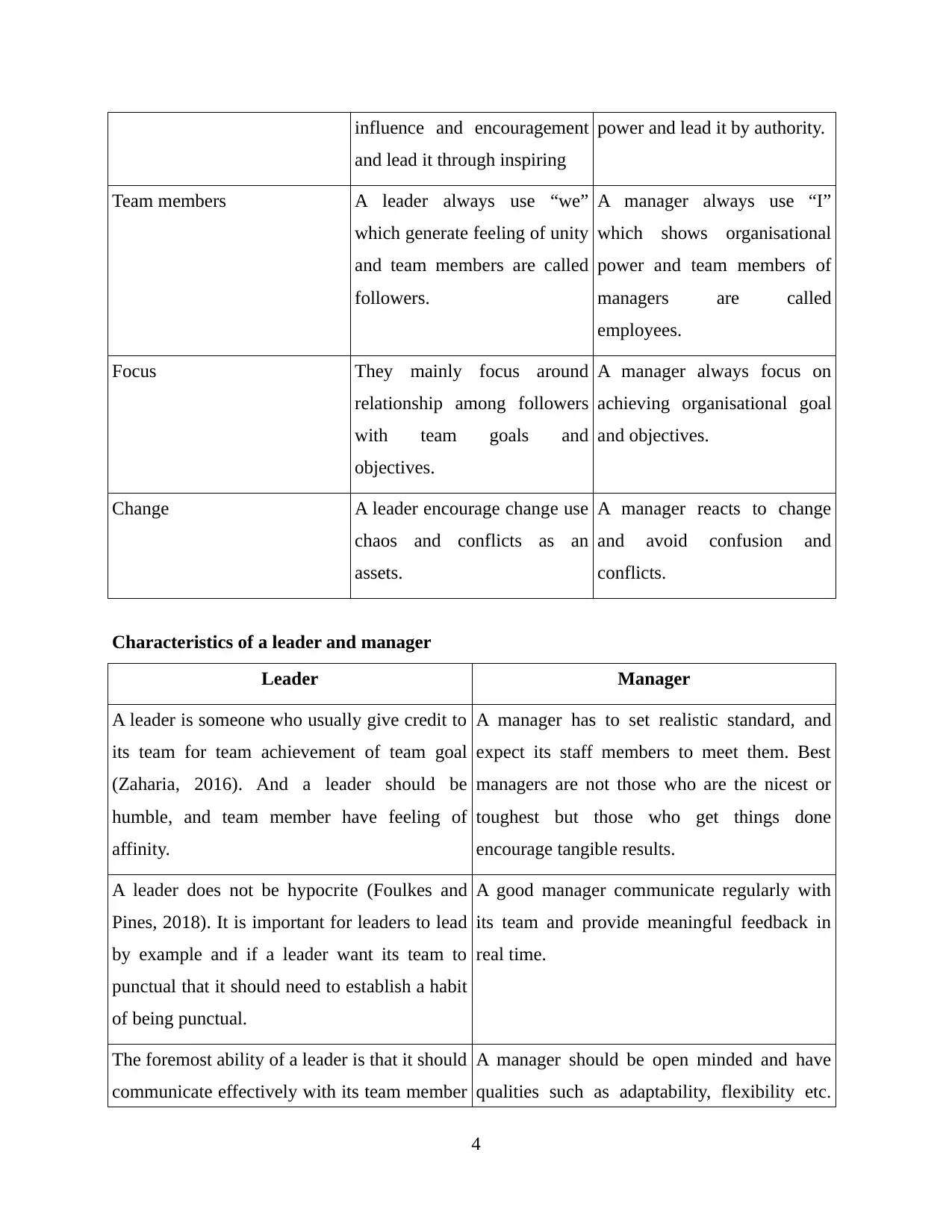
influence and encouragement
and lead it through inspiring
power and lead it by authority.
Team members A leader always use “we”
which generate feeling of unity
and team members are called
followers.
A manager always use “I”
which shows organisational
power and team members of
managers are called
employees.
Focus They mainly focus around
relationship among followers
with team goals and
objectives.
A manager always focus on
achieving organisational goal
and objectives.
Change A leader encourage change use
chaos and conflicts as an
assets.
A manager reacts to change
and avoid confusion and
conflicts.
Characteristics of a leader and manager
Leader Manager
A leader is someone who usually give credit to
its team for team achievement of team goal
(Zaharia, 2016). And a leader should be
humble, and team member have feeling of
affinity.
A manager has to set realistic standard, and
expect its staff members to meet them. Best
managers are not those who are the nicest or
toughest but those who get things done
encourage tangible results.
A leader does not be hypocrite (Foulkes and
Pines, 2018). It is important for leaders to lead
by example and if a leader want its team to
punctual that it should need to establish a habit
of being punctual.
A good manager communicate regularly with
its team and provide meaningful feedback in
real time.
The foremost ability of a leader is that it should
communicate effectively with its team member
A manager should be open minded and have
qualities such as adaptability, flexibility etc.
4
and lead it through inspiring
power and lead it by authority.
Team members A leader always use “we”
which generate feeling of unity
and team members are called
followers.
A manager always use “I”
which shows organisational
power and team members of
managers are called
employees.
Focus They mainly focus around
relationship among followers
with team goals and
objectives.
A manager always focus on
achieving organisational goal
and objectives.
Change A leader encourage change use
chaos and conflicts as an
assets.
A manager reacts to change
and avoid confusion and
conflicts.
Characteristics of a leader and manager
Leader Manager
A leader is someone who usually give credit to
its team for team achievement of team goal
(Zaharia, 2016). And a leader should be
humble, and team member have feeling of
affinity.
A manager has to set realistic standard, and
expect its staff members to meet them. Best
managers are not those who are the nicest or
toughest but those who get things done
encourage tangible results.
A leader does not be hypocrite (Foulkes and
Pines, 2018). It is important for leaders to lead
by example and if a leader want its team to
punctual that it should need to establish a habit
of being punctual.
A good manager communicate regularly with
its team and provide meaningful feedback in
real time.
The foremost ability of a leader is that it should
communicate effectively with its team member
A manager should be open minded and have
qualities such as adaptability, flexibility etc.
4
Paraphrase This Document
Need a fresh take? Get an instant paraphrase of this document with our AI Paraphraser
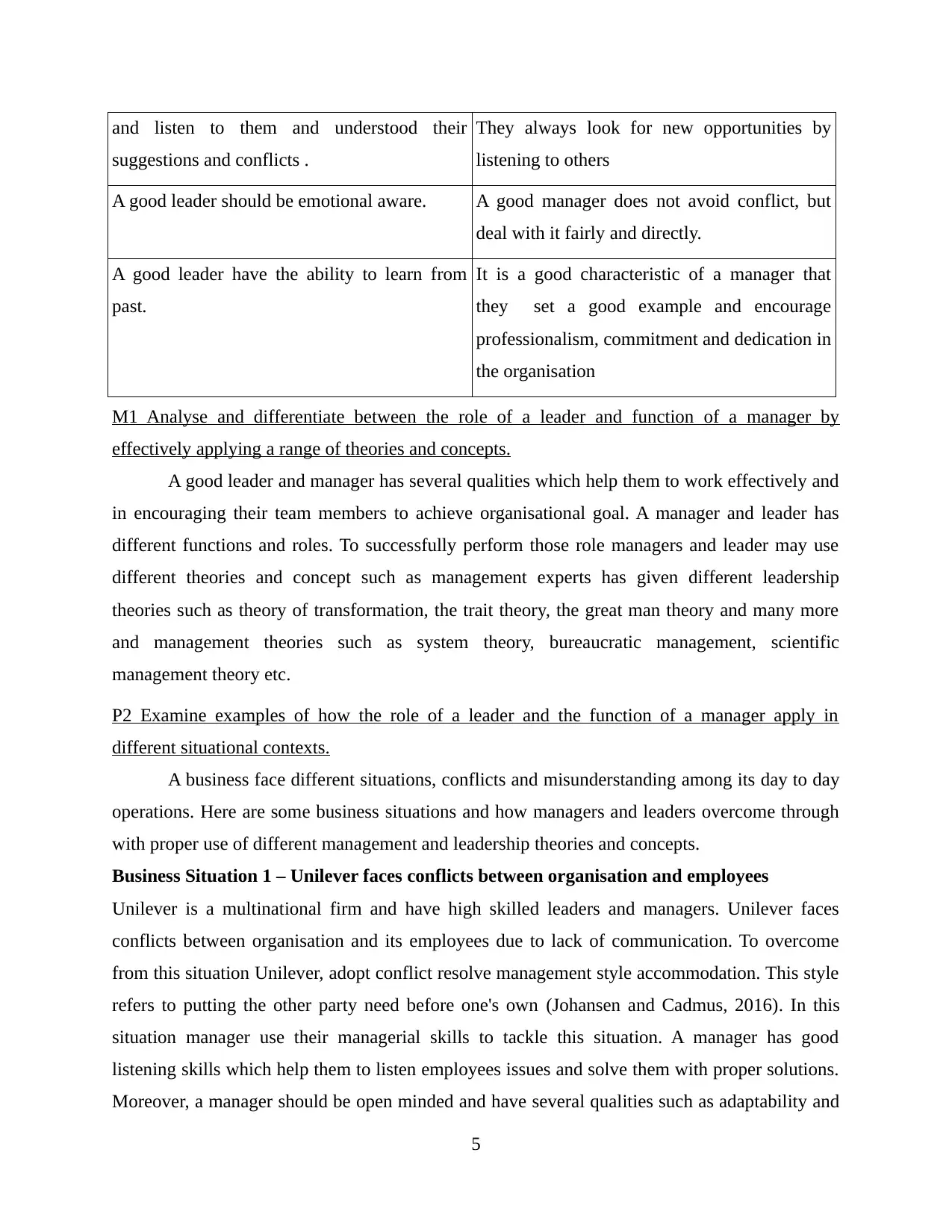
and listen to them and understood their
suggestions and conflicts .
They always look for new opportunities by
listening to others
A good leader should be emotional aware. A good manager does not avoid conflict, but
deal with it fairly and directly.
A good leader have the ability to learn from
past.
It is a good characteristic of a manager that
they set a good example and encourage
professionalism, commitment and dedication in
the organisation
M1 Analyse and differentiate between the role of a leader and function of a manager by
effectively applying a range of theories and concepts.
A good leader and manager has several qualities which help them to work effectively and
in encouraging their team members to achieve organisational goal. A manager and leader has
different functions and roles. To successfully perform those role managers and leader may use
different theories and concept such as management experts has given different leadership
theories such as theory of transformation, the trait theory, the great man theory and many more
and management theories such as system theory, bureaucratic management, scientific
management theory etc.
P2 Examine examples of how the role of a leader and the function of a manager apply in
different situational contexts.
A business face different situations, conflicts and misunderstanding among its day to day
operations. Here are some business situations and how managers and leaders overcome through
with proper use of different management and leadership theories and concepts.
Business Situation 1 – Unilever faces conflicts between organisation and employees
Unilever is a multinational firm and have high skilled leaders and managers. Unilever faces
conflicts between organisation and its employees due to lack of communication. To overcome
from this situation Unilever, adopt conflict resolve management style accommodation. This style
refers to putting the other party need before one's own (Johansen and Cadmus, 2016). In this
situation manager use their managerial skills to tackle this situation. A manager has good
listening skills which help them to listen employees issues and solve them with proper solutions.
Moreover, a manager should be open minded and have several qualities such as adaptability and
5
suggestions and conflicts .
They always look for new opportunities by
listening to others
A good leader should be emotional aware. A good manager does not avoid conflict, but
deal with it fairly and directly.
A good leader have the ability to learn from
past.
It is a good characteristic of a manager that
they set a good example and encourage
professionalism, commitment and dedication in
the organisation
M1 Analyse and differentiate between the role of a leader and function of a manager by
effectively applying a range of theories and concepts.
A good leader and manager has several qualities which help them to work effectively and
in encouraging their team members to achieve organisational goal. A manager and leader has
different functions and roles. To successfully perform those role managers and leader may use
different theories and concept such as management experts has given different leadership
theories such as theory of transformation, the trait theory, the great man theory and many more
and management theories such as system theory, bureaucratic management, scientific
management theory etc.
P2 Examine examples of how the role of a leader and the function of a manager apply in
different situational contexts.
A business face different situations, conflicts and misunderstanding among its day to day
operations. Here are some business situations and how managers and leaders overcome through
with proper use of different management and leadership theories and concepts.
Business Situation 1 – Unilever faces conflicts between organisation and employees
Unilever is a multinational firm and have high skilled leaders and managers. Unilever faces
conflicts between organisation and its employees due to lack of communication. To overcome
from this situation Unilever, adopt conflict resolve management style accommodation. This style
refers to putting the other party need before one's own (Johansen and Cadmus, 2016). In this
situation manager use their managerial skills to tackle this situation. A manager has good
listening skills which help them to listen employees issues and solve them with proper solutions.
Moreover, a manager should be open minded and have several qualities such as adaptability and
5
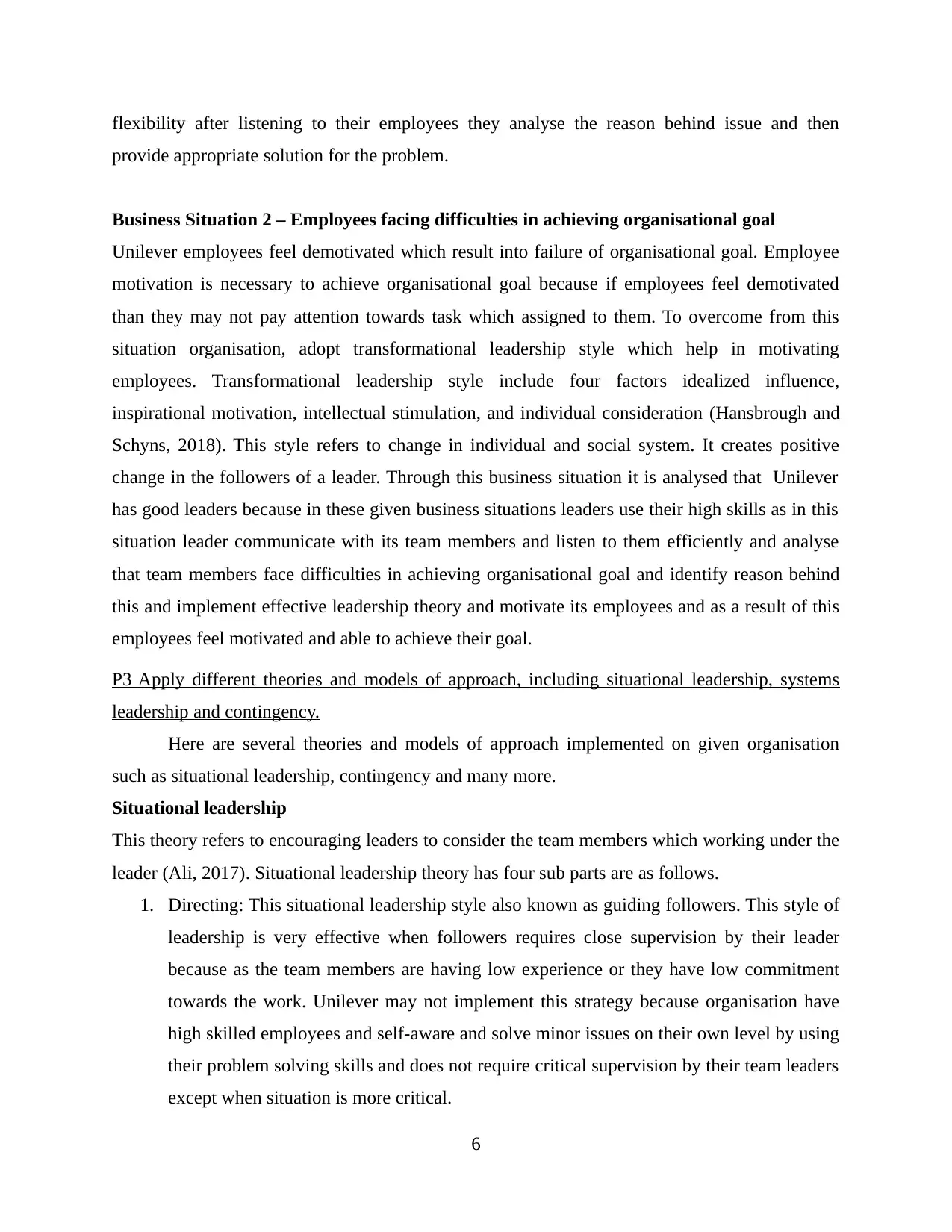
flexibility after listening to their employees they analyse the reason behind issue and then
provide appropriate solution for the problem.
Business Situation 2 – Employees facing difficulties in achieving organisational goal
Unilever employees feel demotivated which result into failure of organisational goal. Employee
motivation is necessary to achieve organisational goal because if employees feel demotivated
than they may not pay attention towards task which assigned to them. To overcome from this
situation organisation, adopt transformational leadership style which help in motivating
employees. Transformational leadership style include four factors idealized influence,
inspirational motivation, intellectual stimulation, and individual consideration (Hansbrough and
Schyns, 2018). This style refers to change in individual and social system. It creates positive
change in the followers of a leader. Through this business situation it is analysed that Unilever
has good leaders because in these given business situations leaders use their high skills as in this
situation leader communicate with its team members and listen to them efficiently and analyse
that team members face difficulties in achieving organisational goal and identify reason behind
this and implement effective leadership theory and motivate its employees and as a result of this
employees feel motivated and able to achieve their goal.
P3 Apply different theories and models of approach, including situational leadership, systems
leadership and contingency.
Here are several theories and models of approach implemented on given organisation
such as situational leadership, contingency and many more.
Situational leadership
This theory refers to encouraging leaders to consider the team members which working under the
leader (Ali, 2017). Situational leadership theory has four sub parts are as follows.
1. Directing: This situational leadership style also known as guiding followers. This style of
leadership is very effective when followers requires close supervision by their leader
because as the team members are having low experience or they have low commitment
towards the work. Unilever may not implement this strategy because organisation have
high skilled employees and self-aware and solve minor issues on their own level by using
their problem solving skills and does not require critical supervision by their team leaders
except when situation is more critical.
6
provide appropriate solution for the problem.
Business Situation 2 – Employees facing difficulties in achieving organisational goal
Unilever employees feel demotivated which result into failure of organisational goal. Employee
motivation is necessary to achieve organisational goal because if employees feel demotivated
than they may not pay attention towards task which assigned to them. To overcome from this
situation organisation, adopt transformational leadership style which help in motivating
employees. Transformational leadership style include four factors idealized influence,
inspirational motivation, intellectual stimulation, and individual consideration (Hansbrough and
Schyns, 2018). This style refers to change in individual and social system. It creates positive
change in the followers of a leader. Through this business situation it is analysed that Unilever
has good leaders because in these given business situations leaders use their high skills as in this
situation leader communicate with its team members and listen to them efficiently and analyse
that team members face difficulties in achieving organisational goal and identify reason behind
this and implement effective leadership theory and motivate its employees and as a result of this
employees feel motivated and able to achieve their goal.
P3 Apply different theories and models of approach, including situational leadership, systems
leadership and contingency.
Here are several theories and models of approach implemented on given organisation
such as situational leadership, contingency and many more.
Situational leadership
This theory refers to encouraging leaders to consider the team members which working under the
leader (Ali, 2017). Situational leadership theory has four sub parts are as follows.
1. Directing: This situational leadership style also known as guiding followers. This style of
leadership is very effective when followers requires close supervision by their leader
because as the team members are having low experience or they have low commitment
towards the work. Unilever may not implement this strategy because organisation have
high skilled employees and self-aware and solve minor issues on their own level by using
their problem solving skills and does not require critical supervision by their team leaders
except when situation is more critical.
6
⊘ This is a preview!⊘
Do you want full access?
Subscribe today to unlock all pages.

Trusted by 1+ million students worldwide
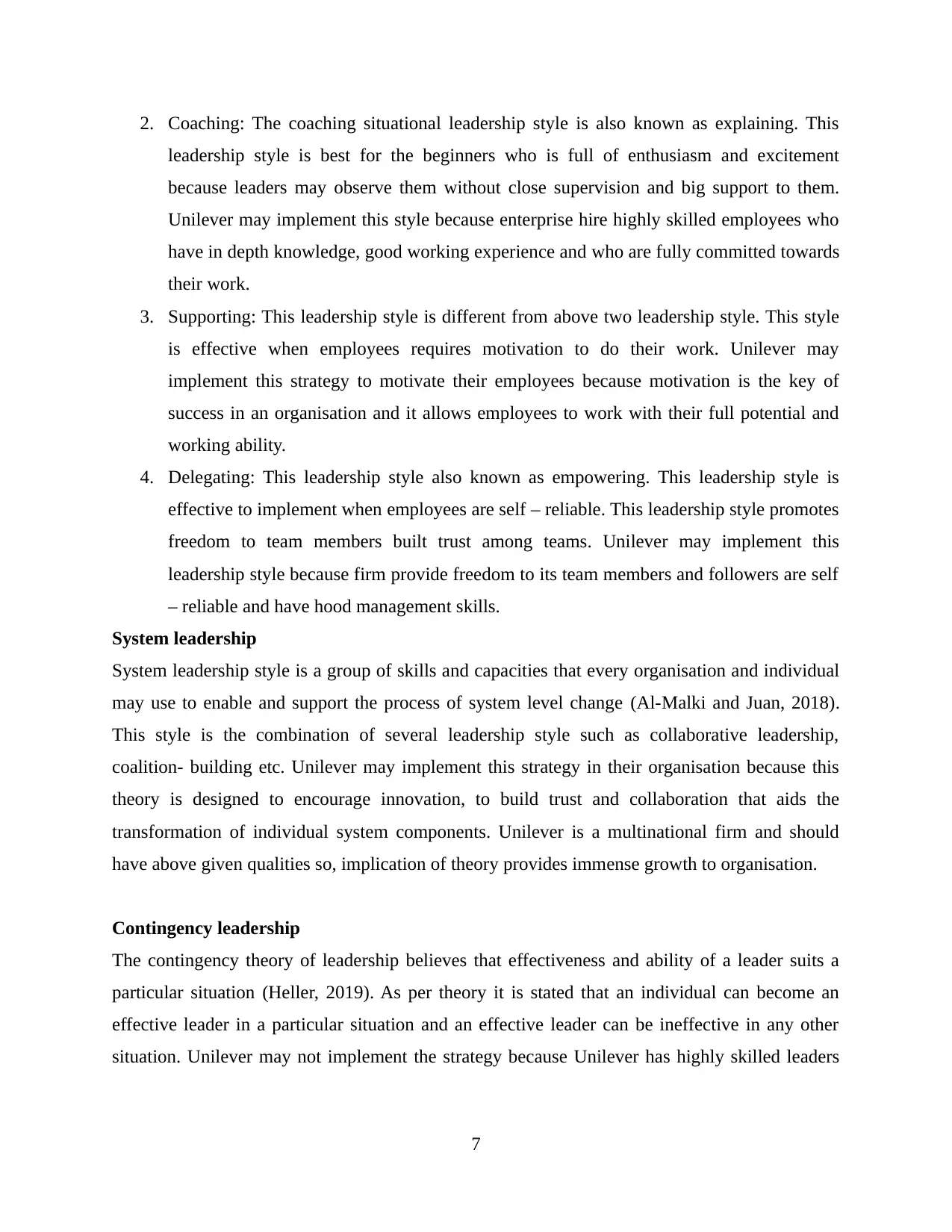
2. Coaching: The coaching situational leadership style is also known as explaining. This
leadership style is best for the beginners who is full of enthusiasm and excitement
because leaders may observe them without close supervision and big support to them.
Unilever may implement this style because enterprise hire highly skilled employees who
have in depth knowledge, good working experience and who are fully committed towards
their work.
3. Supporting: This leadership style is different from above two leadership style. This style
is effective when employees requires motivation to do their work. Unilever may
implement this strategy to motivate their employees because motivation is the key of
success in an organisation and it allows employees to work with their full potential and
working ability.
4. Delegating: This leadership style also known as empowering. This leadership style is
effective to implement when employees are self – reliable. This leadership style promotes
freedom to team members built trust among teams. Unilever may implement this
leadership style because firm provide freedom to its team members and followers are self
– reliable and have hood management skills.
System leadership
System leadership style is a group of skills and capacities that every organisation and individual
may use to enable and support the process of system level change (Al-Malki and Juan, 2018).
This style is the combination of several leadership style such as collaborative leadership,
coalition- building etc. Unilever may implement this strategy in their organisation because this
theory is designed to encourage innovation, to build trust and collaboration that aids the
transformation of individual system components. Unilever is a multinational firm and should
have above given qualities so, implication of theory provides immense growth to organisation.
Contingency leadership
The contingency theory of leadership believes that effectiveness and ability of a leader suits a
particular situation (Heller, 2019). As per theory it is stated that an individual can become an
effective leader in a particular situation and an effective leader can be ineffective in any other
situation. Unilever may not implement the strategy because Unilever has highly skilled leaders
7
leadership style is best for the beginners who is full of enthusiasm and excitement
because leaders may observe them without close supervision and big support to them.
Unilever may implement this style because enterprise hire highly skilled employees who
have in depth knowledge, good working experience and who are fully committed towards
their work.
3. Supporting: This leadership style is different from above two leadership style. This style
is effective when employees requires motivation to do their work. Unilever may
implement this strategy to motivate their employees because motivation is the key of
success in an organisation and it allows employees to work with their full potential and
working ability.
4. Delegating: This leadership style also known as empowering. This leadership style is
effective to implement when employees are self – reliable. This leadership style promotes
freedom to team members built trust among teams. Unilever may implement this
leadership style because firm provide freedom to its team members and followers are self
– reliable and have hood management skills.
System leadership
System leadership style is a group of skills and capacities that every organisation and individual
may use to enable and support the process of system level change (Al-Malki and Juan, 2018).
This style is the combination of several leadership style such as collaborative leadership,
coalition- building etc. Unilever may implement this strategy in their organisation because this
theory is designed to encourage innovation, to build trust and collaboration that aids the
transformation of individual system components. Unilever is a multinational firm and should
have above given qualities so, implication of theory provides immense growth to organisation.
Contingency leadership
The contingency theory of leadership believes that effectiveness and ability of a leader suits a
particular situation (Heller, 2019). As per theory it is stated that an individual can become an
effective leader in a particular situation and an effective leader can be ineffective in any other
situation. Unilever may not implement the strategy because Unilever has highly skilled leaders
7
Paraphrase This Document
Need a fresh take? Get an instant paraphrase of this document with our AI Paraphraser
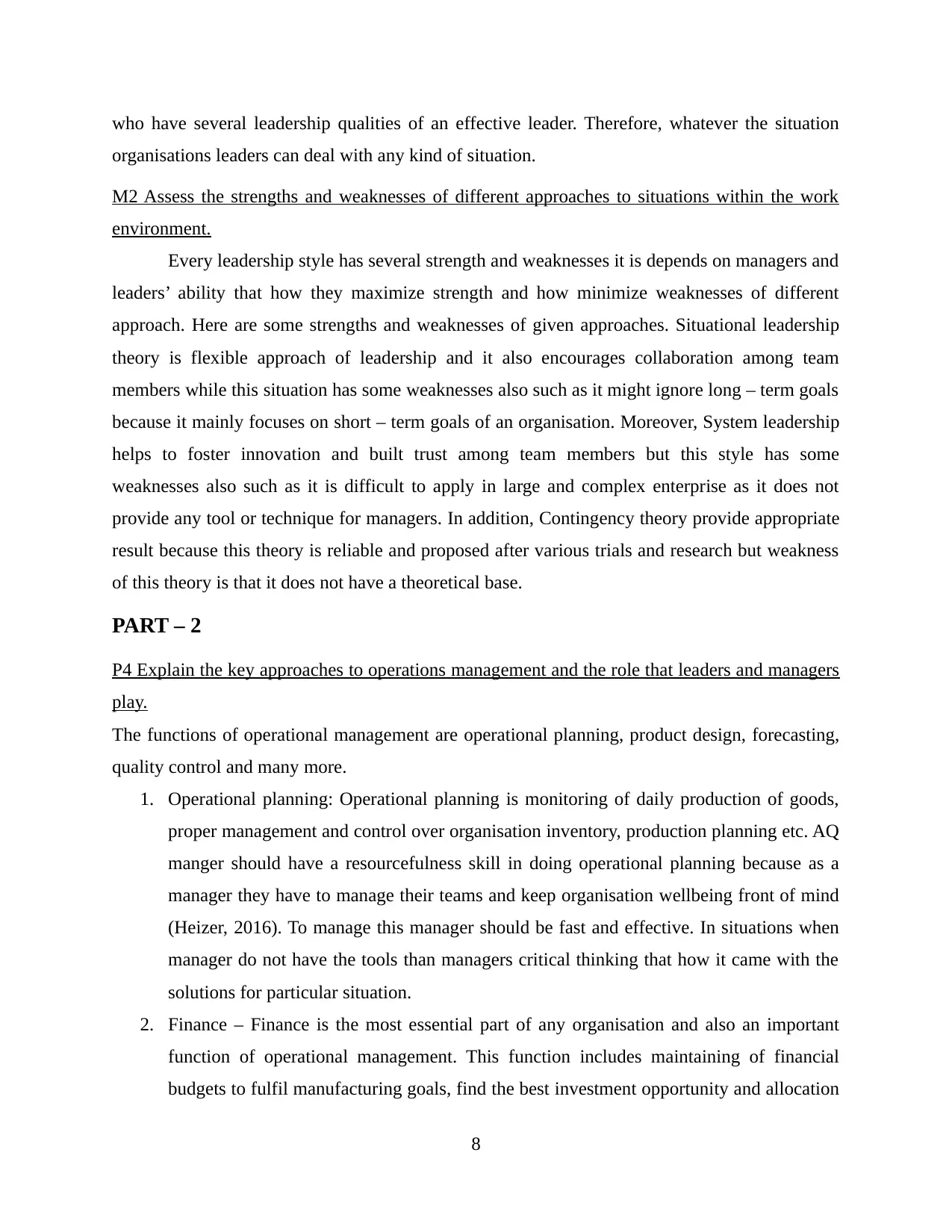
who have several leadership qualities of an effective leader. Therefore, whatever the situation
organisations leaders can deal with any kind of situation.
M2 Assess the strengths and weaknesses of different approaches to situations within the work
environment.
Every leadership style has several strength and weaknesses it is depends on managers and
leaders’ ability that how they maximize strength and how minimize weaknesses of different
approach. Here are some strengths and weaknesses of given approaches. Situational leadership
theory is flexible approach of leadership and it also encourages collaboration among team
members while this situation has some weaknesses also such as it might ignore long – term goals
because it mainly focuses on short – term goals of an organisation. Moreover, System leadership
helps to foster innovation and built trust among team members but this style has some
weaknesses also such as it is difficult to apply in large and complex enterprise as it does not
provide any tool or technique for managers. In addition, Contingency theory provide appropriate
result because this theory is reliable and proposed after various trials and research but weakness
of this theory is that it does not have a theoretical base.
PART – 2
P4 Explain the key approaches to operations management and the role that leaders and managers
play.
The functions of operational management are operational planning, product design, forecasting,
quality control and many more.
1. Operational planning: Operational planning is monitoring of daily production of goods,
proper management and control over organisation inventory, production planning etc. AQ
manger should have a resourcefulness skill in doing operational planning because as a
manager they have to manage their teams and keep organisation wellbeing front of mind
(Heizer, 2016). To manage this manager should be fast and effective. In situations when
manager do not have the tools than managers critical thinking that how it came with the
solutions for particular situation.
2. Finance – Finance is the most essential part of any organisation and also an important
function of operational management. This function includes maintaining of financial
budgets to fulfil manufacturing goals, find the best investment opportunity and allocation
8
organisations leaders can deal with any kind of situation.
M2 Assess the strengths and weaknesses of different approaches to situations within the work
environment.
Every leadership style has several strength and weaknesses it is depends on managers and
leaders’ ability that how they maximize strength and how minimize weaknesses of different
approach. Here are some strengths and weaknesses of given approaches. Situational leadership
theory is flexible approach of leadership and it also encourages collaboration among team
members while this situation has some weaknesses also such as it might ignore long – term goals
because it mainly focuses on short – term goals of an organisation. Moreover, System leadership
helps to foster innovation and built trust among team members but this style has some
weaknesses also such as it is difficult to apply in large and complex enterprise as it does not
provide any tool or technique for managers. In addition, Contingency theory provide appropriate
result because this theory is reliable and proposed after various trials and research but weakness
of this theory is that it does not have a theoretical base.
PART – 2
P4 Explain the key approaches to operations management and the role that leaders and managers
play.
The functions of operational management are operational planning, product design, forecasting,
quality control and many more.
1. Operational planning: Operational planning is monitoring of daily production of goods,
proper management and control over organisation inventory, production planning etc. AQ
manger should have a resourcefulness skill in doing operational planning because as a
manager they have to manage their teams and keep organisation wellbeing front of mind
(Heizer, 2016). To manage this manager should be fast and effective. In situations when
manager do not have the tools than managers critical thinking that how it came with the
solutions for particular situation.
2. Finance – Finance is the most essential part of any organisation and also an important
function of operational management. This function includes maintaining of financial
budgets to fulfil manufacturing goals, find the best investment opportunity and allocation
8
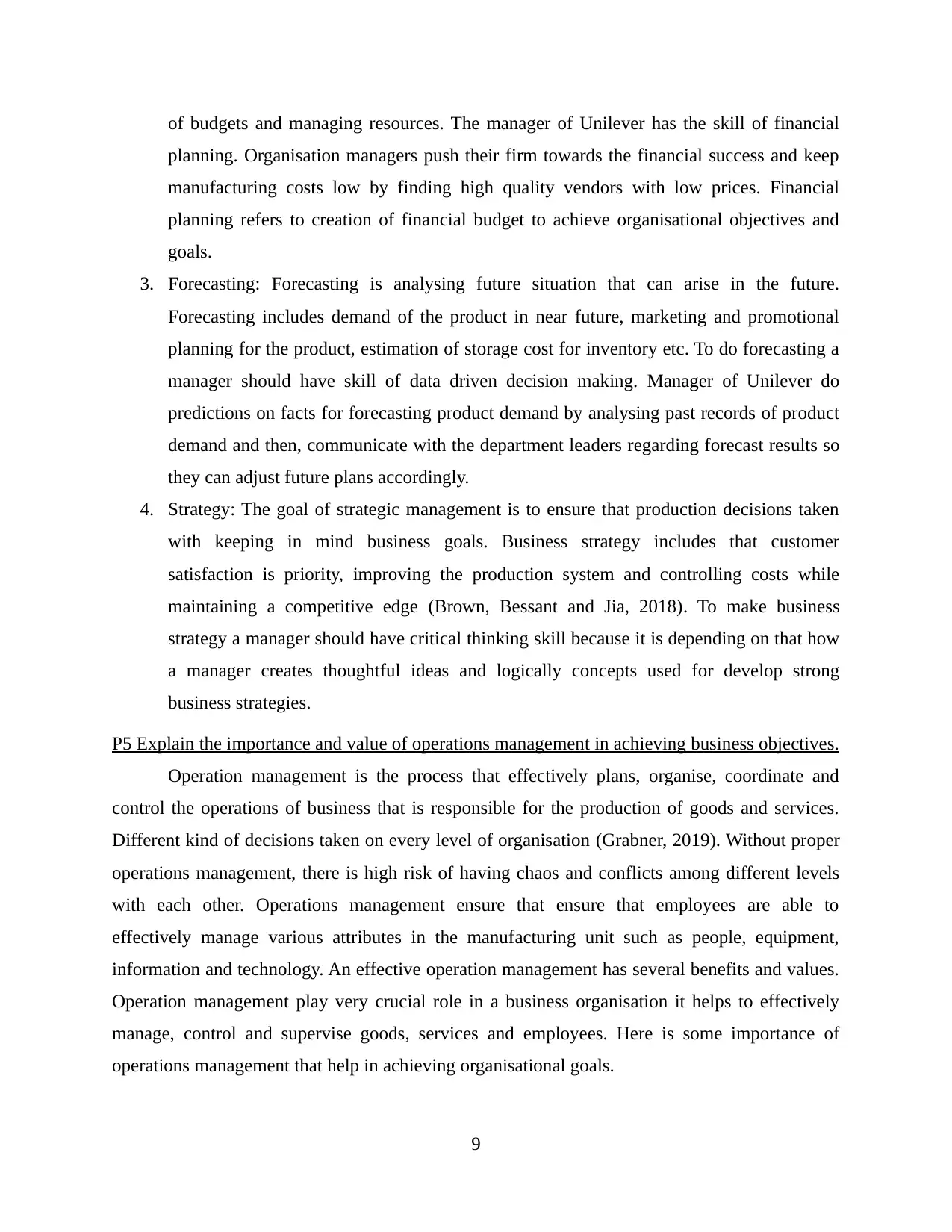
of budgets and managing resources. The manager of Unilever has the skill of financial
planning. Organisation managers push their firm towards the financial success and keep
manufacturing costs low by finding high quality vendors with low prices. Financial
planning refers to creation of financial budget to achieve organisational objectives and
goals.
3. Forecasting: Forecasting is analysing future situation that can arise in the future.
Forecasting includes demand of the product in near future, marketing and promotional
planning for the product, estimation of storage cost for inventory etc. To do forecasting a
manager should have skill of data driven decision making. Manager of Unilever do
predictions on facts for forecasting product demand by analysing past records of product
demand and then, communicate with the department leaders regarding forecast results so
they can adjust future plans accordingly.
4. Strategy: The goal of strategic management is to ensure that production decisions taken
with keeping in mind business goals. Business strategy includes that customer
satisfaction is priority, improving the production system and controlling costs while
maintaining a competitive edge (Brown, Bessant and Jia, 2018). To make business
strategy a manager should have critical thinking skill because it is depending on that how
a manager creates thoughtful ideas and logically concepts used for develop strong
business strategies.
P5 Explain the importance and value of operations management in achieving business objectives.
Operation management is the process that effectively plans, organise, coordinate and
control the operations of business that is responsible for the production of goods and services.
Different kind of decisions taken on every level of organisation (Grabner, 2019). Without proper
operations management, there is high risk of having chaos and conflicts among different levels
with each other. Operations management ensure that ensure that employees are able to
effectively manage various attributes in the manufacturing unit such as people, equipment,
information and technology. An effective operation management has several benefits and values.
Operation management play very crucial role in a business organisation it helps to effectively
manage, control and supervise goods, services and employees. Here is some importance of
operations management that help in achieving organisational goals.
9
planning. Organisation managers push their firm towards the financial success and keep
manufacturing costs low by finding high quality vendors with low prices. Financial
planning refers to creation of financial budget to achieve organisational objectives and
goals.
3. Forecasting: Forecasting is analysing future situation that can arise in the future.
Forecasting includes demand of the product in near future, marketing and promotional
planning for the product, estimation of storage cost for inventory etc. To do forecasting a
manager should have skill of data driven decision making. Manager of Unilever do
predictions on facts for forecasting product demand by analysing past records of product
demand and then, communicate with the department leaders regarding forecast results so
they can adjust future plans accordingly.
4. Strategy: The goal of strategic management is to ensure that production decisions taken
with keeping in mind business goals. Business strategy includes that customer
satisfaction is priority, improving the production system and controlling costs while
maintaining a competitive edge (Brown, Bessant and Jia, 2018). To make business
strategy a manager should have critical thinking skill because it is depending on that how
a manager creates thoughtful ideas and logically concepts used for develop strong
business strategies.
P5 Explain the importance and value of operations management in achieving business objectives.
Operation management is the process that effectively plans, organise, coordinate and
control the operations of business that is responsible for the production of goods and services.
Different kind of decisions taken on every level of organisation (Grabner, 2019). Without proper
operations management, there is high risk of having chaos and conflicts among different levels
with each other. Operations management ensure that ensure that employees are able to
effectively manage various attributes in the manufacturing unit such as people, equipment,
information and technology. An effective operation management has several benefits and values.
Operation management play very crucial role in a business organisation it helps to effectively
manage, control and supervise goods, services and employees. Here is some importance of
operations management that help in achieving organisational goals.
9
⊘ This is a preview!⊘
Do you want full access?
Subscribe today to unlock all pages.

Trusted by 1+ million students worldwide
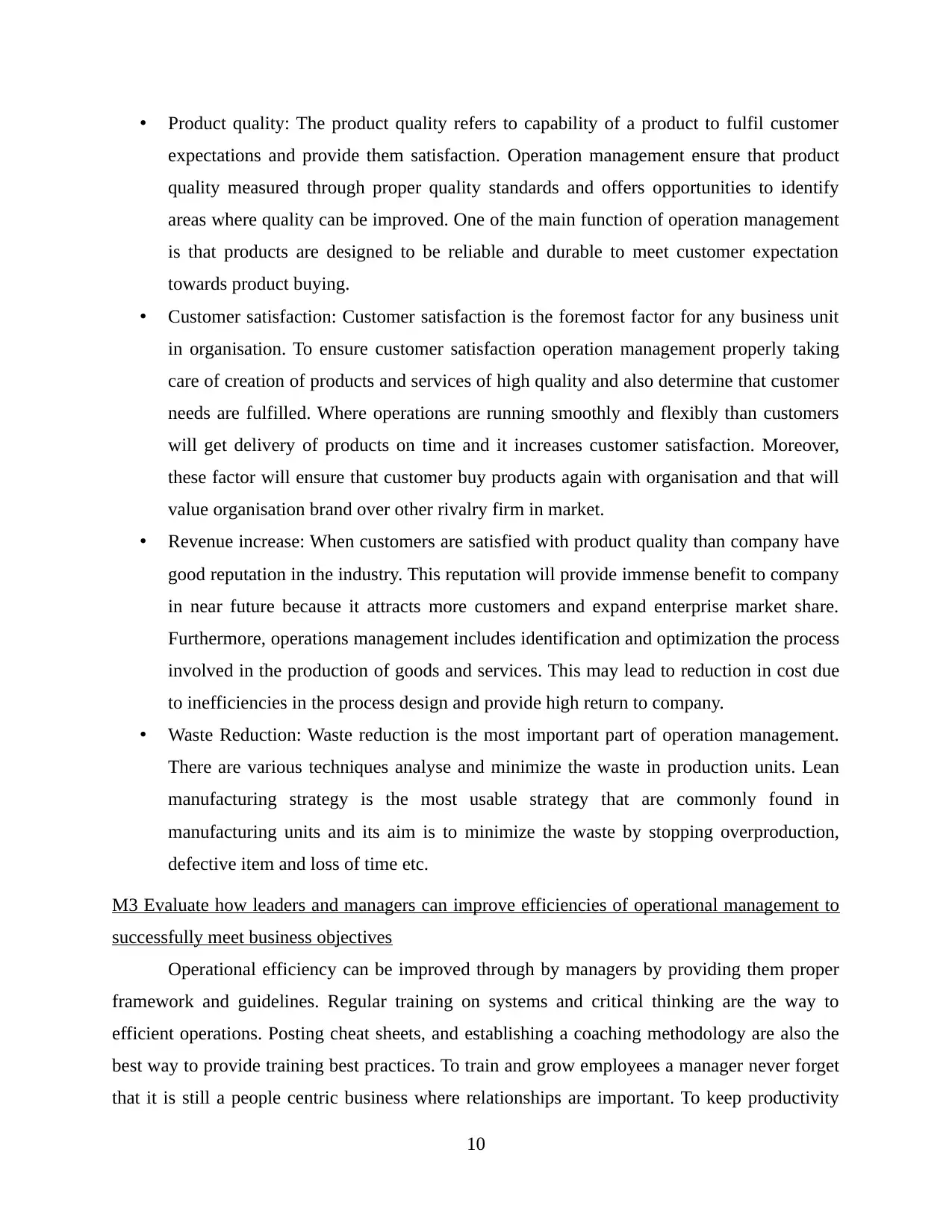
• Product quality: The product quality refers to capability of a product to fulfil customer
expectations and provide them satisfaction. Operation management ensure that product
quality measured through proper quality standards and offers opportunities to identify
areas where quality can be improved. One of the main function of operation management
is that products are designed to be reliable and durable to meet customer expectation
towards product buying.
• Customer satisfaction: Customer satisfaction is the foremost factor for any business unit
in organisation. To ensure customer satisfaction operation management properly taking
care of creation of products and services of high quality and also determine that customer
needs are fulfilled. Where operations are running smoothly and flexibly than customers
will get delivery of products on time and it increases customer satisfaction. Moreover,
these factor will ensure that customer buy products again with organisation and that will
value organisation brand over other rivalry firm in market.
• Revenue increase: When customers are satisfied with product quality than company have
good reputation in the industry. This reputation will provide immense benefit to company
in near future because it attracts more customers and expand enterprise market share.
Furthermore, operations management includes identification and optimization the process
involved in the production of goods and services. This may lead to reduction in cost due
to inefficiencies in the process design and provide high return to company.
• Waste Reduction: Waste reduction is the most important part of operation management.
There are various techniques analyse and minimize the waste in production units. Lean
manufacturing strategy is the most usable strategy that are commonly found in
manufacturing units and its aim is to minimize the waste by stopping overproduction,
defective item and loss of time etc.
M3 Evaluate how leaders and managers can improve efficiencies of operational management to
successfully meet business objectives
Operational efficiency can be improved through by managers by providing them proper
framework and guidelines. Regular training on systems and critical thinking are the way to
efficient operations. Posting cheat sheets, and establishing a coaching methodology are also the
best way to provide training best practices. To train and grow employees a manager never forget
that it is still a people centric business where relationships are important. To keep productivity
10
expectations and provide them satisfaction. Operation management ensure that product
quality measured through proper quality standards and offers opportunities to identify
areas where quality can be improved. One of the main function of operation management
is that products are designed to be reliable and durable to meet customer expectation
towards product buying.
• Customer satisfaction: Customer satisfaction is the foremost factor for any business unit
in organisation. To ensure customer satisfaction operation management properly taking
care of creation of products and services of high quality and also determine that customer
needs are fulfilled. Where operations are running smoothly and flexibly than customers
will get delivery of products on time and it increases customer satisfaction. Moreover,
these factor will ensure that customer buy products again with organisation and that will
value organisation brand over other rivalry firm in market.
• Revenue increase: When customers are satisfied with product quality than company have
good reputation in the industry. This reputation will provide immense benefit to company
in near future because it attracts more customers and expand enterprise market share.
Furthermore, operations management includes identification and optimization the process
involved in the production of goods and services. This may lead to reduction in cost due
to inefficiencies in the process design and provide high return to company.
• Waste Reduction: Waste reduction is the most important part of operation management.
There are various techniques analyse and minimize the waste in production units. Lean
manufacturing strategy is the most usable strategy that are commonly found in
manufacturing units and its aim is to minimize the waste by stopping overproduction,
defective item and loss of time etc.
M3 Evaluate how leaders and managers can improve efficiencies of operational management to
successfully meet business objectives
Operational efficiency can be improved through by managers by providing them proper
framework and guidelines. Regular training on systems and critical thinking are the way to
efficient operations. Posting cheat sheets, and establishing a coaching methodology are also the
best way to provide training best practices. To train and grow employees a manager never forget
that it is still a people centric business where relationships are important. To keep productivity
10
Paraphrase This Document
Need a fresh take? Get an instant paraphrase of this document with our AI Paraphraser
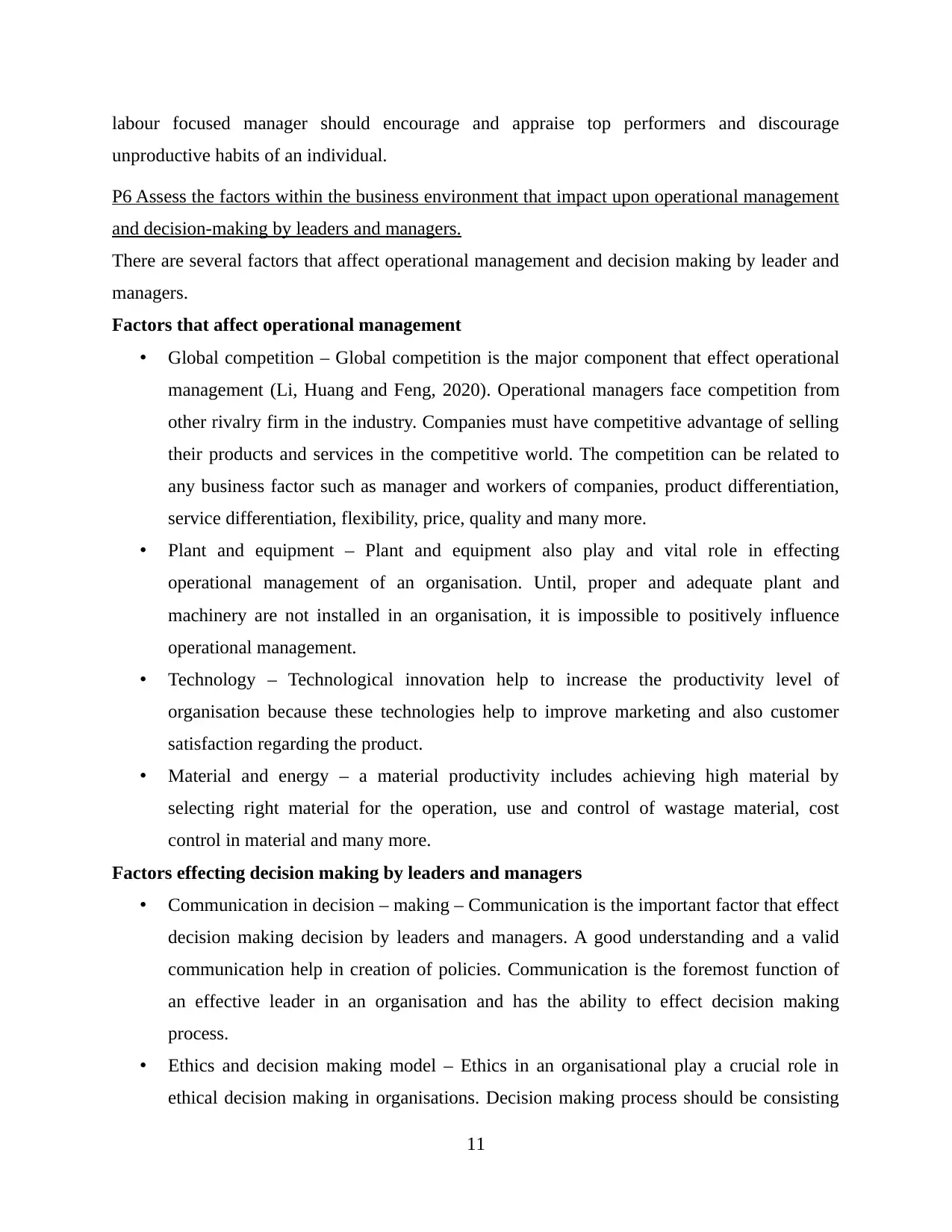
labour focused manager should encourage and appraise top performers and discourage
unproductive habits of an individual.
P6 Assess the factors within the business environment that impact upon operational management
and decision-making by leaders and managers.
There are several factors that affect operational management and decision making by leader and
managers.
Factors that affect operational management
• Global competition – Global competition is the major component that effect operational
management (Li, Huang and Feng, 2020). Operational managers face competition from
other rivalry firm in the industry. Companies must have competitive advantage of selling
their products and services in the competitive world. The competition can be related to
any business factor such as manager and workers of companies, product differentiation,
service differentiation, flexibility, price, quality and many more.
• Plant and equipment – Plant and equipment also play and vital role in effecting
operational management of an organisation. Until, proper and adequate plant and
machinery are not installed in an organisation, it is impossible to positively influence
operational management.
• Technology – Technological innovation help to increase the productivity level of
organisation because these technologies help to improve marketing and also customer
satisfaction regarding the product.
• Material and energy – a material productivity includes achieving high material by
selecting right material for the operation, use and control of wastage material, cost
control in material and many more.
Factors effecting decision making by leaders and managers
• Communication in decision – making – Communication is the important factor that effect
decision making decision by leaders and managers. A good understanding and a valid
communication help in creation of policies. Communication is the foremost function of
an effective leader in an organisation and has the ability to effect decision making
process.
• Ethics and decision making model – Ethics in an organisational play a crucial role in
ethical decision making in organisations. Decision making process should be consisting
11
unproductive habits of an individual.
P6 Assess the factors within the business environment that impact upon operational management
and decision-making by leaders and managers.
There are several factors that affect operational management and decision making by leader and
managers.
Factors that affect operational management
• Global competition – Global competition is the major component that effect operational
management (Li, Huang and Feng, 2020). Operational managers face competition from
other rivalry firm in the industry. Companies must have competitive advantage of selling
their products and services in the competitive world. The competition can be related to
any business factor such as manager and workers of companies, product differentiation,
service differentiation, flexibility, price, quality and many more.
• Plant and equipment – Plant and equipment also play and vital role in effecting
operational management of an organisation. Until, proper and adequate plant and
machinery are not installed in an organisation, it is impossible to positively influence
operational management.
• Technology – Technological innovation help to increase the productivity level of
organisation because these technologies help to improve marketing and also customer
satisfaction regarding the product.
• Material and energy – a material productivity includes achieving high material by
selecting right material for the operation, use and control of wastage material, cost
control in material and many more.
Factors effecting decision making by leaders and managers
• Communication in decision – making – Communication is the important factor that effect
decision making decision by leaders and managers. A good understanding and a valid
communication help in creation of policies. Communication is the foremost function of
an effective leader in an organisation and has the ability to effect decision making
process.
• Ethics and decision making model – Ethics in an organisational play a crucial role in
ethical decision making in organisations. Decision making process should be consisting
11
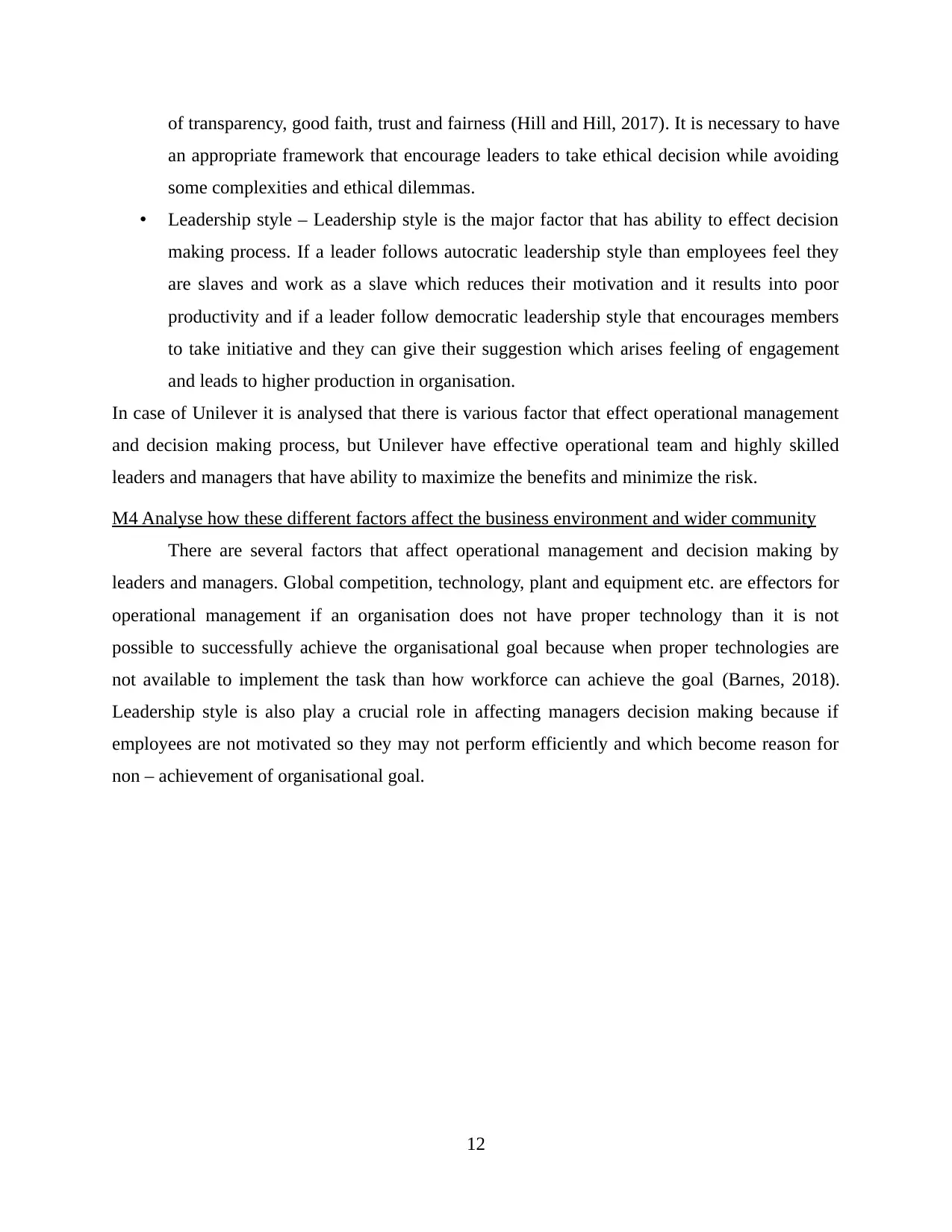
of transparency, good faith, trust and fairness (Hill and Hill, 2017). It is necessary to have
an appropriate framework that encourage leaders to take ethical decision while avoiding
some complexities and ethical dilemmas.
• Leadership style – Leadership style is the major factor that has ability to effect decision
making process. If a leader follows autocratic leadership style than employees feel they
are slaves and work as a slave which reduces their motivation and it results into poor
productivity and if a leader follow democratic leadership style that encourages members
to take initiative and they can give their suggestion which arises feeling of engagement
and leads to higher production in organisation.
In case of Unilever it is analysed that there is various factor that effect operational management
and decision making process, but Unilever have effective operational team and highly skilled
leaders and managers that have ability to maximize the benefits and minimize the risk.
M4 Analyse how these different factors affect the business environment and wider community
There are several factors that affect operational management and decision making by
leaders and managers. Global competition, technology, plant and equipment etc. are effectors for
operational management if an organisation does not have proper technology than it is not
possible to successfully achieve the organisational goal because when proper technologies are
not available to implement the task than how workforce can achieve the goal (Barnes, 2018).
Leadership style is also play a crucial role in affecting managers decision making because if
employees are not motivated so they may not perform efficiently and which become reason for
non – achievement of organisational goal.
12
an appropriate framework that encourage leaders to take ethical decision while avoiding
some complexities and ethical dilemmas.
• Leadership style – Leadership style is the major factor that has ability to effect decision
making process. If a leader follows autocratic leadership style than employees feel they
are slaves and work as a slave which reduces their motivation and it results into poor
productivity and if a leader follow democratic leadership style that encourages members
to take initiative and they can give their suggestion which arises feeling of engagement
and leads to higher production in organisation.
In case of Unilever it is analysed that there is various factor that effect operational management
and decision making process, but Unilever have effective operational team and highly skilled
leaders and managers that have ability to maximize the benefits and minimize the risk.
M4 Analyse how these different factors affect the business environment and wider community
There are several factors that affect operational management and decision making by
leaders and managers. Global competition, technology, plant and equipment etc. are effectors for
operational management if an organisation does not have proper technology than it is not
possible to successfully achieve the organisational goal because when proper technologies are
not available to implement the task than how workforce can achieve the goal (Barnes, 2018).
Leadership style is also play a crucial role in affecting managers decision making because if
employees are not motivated so they may not perform efficiently and which become reason for
non – achievement of organisational goal.
12
⊘ This is a preview!⊘
Do you want full access?
Subscribe today to unlock all pages.

Trusted by 1+ million students worldwide
1 out of 14
Related Documents
Your All-in-One AI-Powered Toolkit for Academic Success.
+13062052269
info@desklib.com
Available 24*7 on WhatsApp / Email
![[object Object]](/_next/static/media/star-bottom.7253800d.svg)
Unlock your academic potential
Copyright © 2020–2026 A2Z Services. All Rights Reserved. Developed and managed by ZUCOL.





